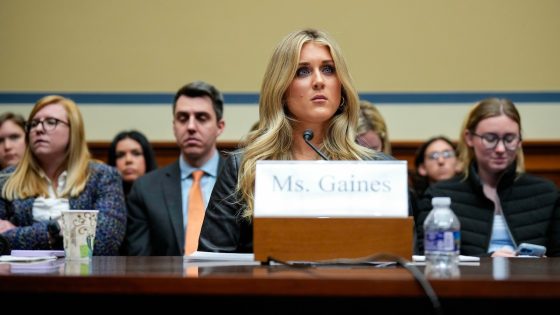More than a dozen female athletes have sued the National Collegiate Athletic Association over its transgender participation policy, which the athletes claim violates their rights under Title IX, the law that prohibits discrimination based on sex at any institution that receives federal funding.
The lawsuit stems from the January 2022 ruling by the NCAA Board of Governors that allows transgender athletes to compete in the category of their affirmed gender on a sport-by-sport basis. The NCAA said that this ruling “preserves opportunity for transgender student-athletes while balancing fairness, inclusion and safety for all who compete.”
This week, 16 female athletes across sports like swimming, soccer and track and field, filed the lawsuit, saying in the lawsuit that they “bring this case to secure for future generations of women the promise of Title IX that is being denied them and other college women.”
“A lot of people ask us, why did we wait this long to file a lawsuit? Well, we waited this long to allow the NCAA every opportunity to make the right decision,” Kaitlynn Wheeler, a former University of Kentucky swimmer, told ABC News.
“The NCAA’s most basic job is to protect the fairness and the safety of its athletes, and it has failed on that simple task,” Wheeler said.
In this March 18, 2022, file photo, University of Pennsylvania swimmer Lia Thomas and University of Kentucky swimmer Riley Gaines react after finishing tied for 5th in the 200 Freestyle finals at the NCAA Swimming and Diving Championships, at the McAuley Aquatic Center in Atlanta.
Rich Von Biberstein/Icon Sportswire via AP, FILE
The complaint highlights an alleged incident at the 2022 NCAA national swimming championship– weeks after the NCAA’s ruling — involving former University of Kentucky swimmer Riley Gaines and Lia Thomas, a transgender swimmer who was competing for the University of Pennsylvania.
According to the lawsuit, Gaines had tied in fifth place with Thomas in the 200 free competition, but that as they prepared for the podium ceremony, Gaines was told by an NCAA official that only Thomas would be allowed to hold the fifth-place trophy.
Gaines says in the lawsuit she questioned the official, who the complaint alleges told her, “I’m so sorry, we have been advised that when photos are taken it is crucial that Lia Thomas holds the trophy.”
“The secret of Thomas’ meteoric ascendance and dominance in NCAA women’s swimming was retained male advantage,” the lawsuit alleges. Thomas had previously competed in the men’s category prior to the NCAA’s ruling.
“What the plaintiffs are really after is an equal and fair opportunity to succeed. For everybody to be equal at the starting line,” William Bock, the lead attorney in the lawsuit, told ABC News.

In this Jan. 12, 2023, file photo, former University of Kentucky swimmer Riley Gaines, second from right, stands during a rally outside of the NCAA Convention in San Antonio, Texas. Gaines was among more than a dozen college athletes who filed a lawsuit against the NCAA on March 14, 2023, accusing it of violating their Title IX rights by allowing Lia Thomas to compete at national championships in 2022.
Darren Abate/AP, FILE
In a statement, the NCAA said that while it “does not comment on pending litigation, the Association and its members will continue to promote Title IX, make unprecedented investments in women’s sports and ensure fair competition in all NCAA championships.”
In 2022, Lia Thomas sat down with ABC News’ Juju Chang following the University of Pennsylvania swimmer’s historic Division 1 National title win.
“Trans people don’t transition for athletics. we transition to be happy and authentic and our true selves,” Thomas told Chang. “Transitioning to get an advantage is not something that ever factors into our decisions.”
“I knew there would be scrutiny against me if I competed as a woman. I was prepared for that,” Thomas said. “But I also don’t need anybody’s permission to be– myself and to– to do the sport that I love.”
Thomas did not immediately respond to ABC News’ requests for comment on the lawsuit.
Dr. Anna Baeth, director of research at the nonprofit LGBTQ athletic advocacy group Athlete Ally, said in a statement that the organization “firmly” believes that the latest research from advocacy groups and “guidelines at the highest level of sport underscore that transgender athletes do not have an inherent advantage in sport and should be not just accepted, but celebrated, in NCAA sport.”
Source Agencies


